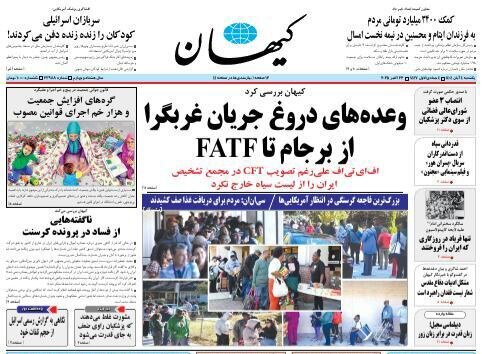Iranian missiles send message of peace through strength

TEHRAN - In a recent commentary, Kayhan explored Iran’s national power and deterrence strategy, arguing that diplomacy must transcend mere dialogue and political exchange.
It described diplomacy as the strategic application of all elements of national power to shape global outcomes. Within the framework of the Islamic Revolution, diplomacy gains meaning only when rooted in independence, self-reliance, and domestically cultivated strength. The commentary emphasized that Iran’s historical experiences—including the (1980-88) imposed war, decades of sanctions, and persistent threats from hegemonic powers—demonstrate that noble ideals are vulnerable without hard power. In this context, missile capability emerges not merely as a military asset but as a symbol of national sovereignty and a cornerstone of deterrence. Iran’s missile arsenal, the article contends, is not a weapon of aggression but a language of enduring peace. It conveys a message: while the Iranian nation will never initiate conflict, it will respond decisively to any act of aggression. In a world governed by the logic of power, Iran must engage oppressive forces in their own terms—through strength.
Hamshahri: A war that reinforced Iran’s power
In an article, Hamshahri assessed Iran’s strategic gains following the 12-day war initiated by Israel. Contrary to Western analyses and critical narratives, the article argued that the war did not diminish Iran’s position; rather it served as a catalyst for a renewed consolidation of power in Tehran. The war, described as a preemptive strike by Israel, provided an opportunity to reaffirm the necessity of Iran’s “extraterritorial defense doctrine”—particularly in the wake of the October 7th operation. The article further noted that the regional environment prompted a reassessment of Iran’s security, military, and economic frameworks. In response to Israeli aggression, the government intensified its involvement and initiated reforms across previously ineffective systems, reinforcing national resilience.
Siasat-e-Rooz: The end of a way
In its latest editorial, Siasat-e-Rooz highlighted the shifting dynamics of Iran’s foreign policy following the expiration of UN Security Council Resolution 2231 that confirmed the JCPOA. Despite persistent Western hostility, the termination of Resolution 2231 was formally announced. The expiration was backed decisively by Russia and China. As a result, Iran’s interactions with the International Atomic Energy Agency will henceforth be governed exclusively by the Non-Proliferation Treaty and standard safeguard protocols. Despite continued Western efforts to maintain a precarious balance, neither war nor peace, through media pressure and sanctions designed to deter international engagement with Iran, the editorial asserts that the Iranian nuclear file has officially normalized. According to the paper, the IAEA must recognize that the era of negotiations and conditional engagement with Iran has ended. Domestically, the editorial calls for a strategic pivot: moving beyond the cycles of past negotiations and focusing on self-reliance. It urges Iranian policymakers to harness internal capacities and align with emerging blocs such as BRICS and the Shanghai Cooperation Organization, positioning Iran within a new international order less dependent on Western frameworks.
Ettelaat: The complexity of power and the call for inclusive diplomacy
In a detailed analysis, Ettelaat examined Iran’s geopolitical posture amid rising geoeconomics competition. The paper warned that recent developments surrounding Iran, particularly in the Caucasus, reflect a coordinated effort to constrain its strategic influence. Iran must clearly declare to regional and trans-regional actors, through diplomatic and military means, that changing international borders and encircling Iran’s geopolitical position in the Caucasus is a red line that could face a tough strategic response. As Western powers seek to reshape West Asia without Iran’s participation, the paper advocated for proactive diplomacy. Tehran must redefine the regional landscape by proposing a comprehensive, indigenous framework for security and economic cooperation. This includes presenting a formal document of partnership to neighboring states, outlining shared goals in corridor development and regional stability. Such an initiative not only enhances Iran’s diplomatic leverage but also reduces the justification for foreign interference and eases the burden of high-stakes geopolitical decisions. By promoting a win-win regional strategy, Iran can assert its role as a stabilizing force in an increasingly fragmented global environment.
Arman-e Melli: Our atomic bomb is ability to say “no” to great powers
Arman-e Melli reported on remarks by Foreign Minister Abbas Araghchi, who emphasized that Iran’s strength lies in its people. Quoting the minister, the newspaper wrote: “Iran’s atomic bomb is the ability to say ‘no’ to the powers, and this has been the case since the victory of the Revolution.” He added that the core problem between Iran and the United States stems from Washington’s domineering attitude, though relations can still be “managed.”
In an online interview, Araghchi also described the unity of Iranians inside and outside the country during the 12-day war with the Zionist regime as a “historic turning point.” On the importance of preserving this unity, he said: “A very auspicious phenomenon that occurred was the national unity both inside and outside the country.” He continued: “Iranians everywhere felt the injustice directed at their nation. The Zionist regime had no justification for its aggression; we had committed no wrongdoing that could provide even the slightest excuse. Our nuclear program is entirely peaceful and a legitimate right. We exercised this right precisely, with no deviation toward weapon production, and no such claim has ever been reported. The questions raised concerned events from 20 or 30 years ago, all of which were answered and resolved. The people recognized this innocence and legitimacy.” Araghchi concluded: “In our culture, no matter how deep our differences of opinion may be, when it comes to Iran—its soil and its homeland—we stand united.”
Leave a Comment